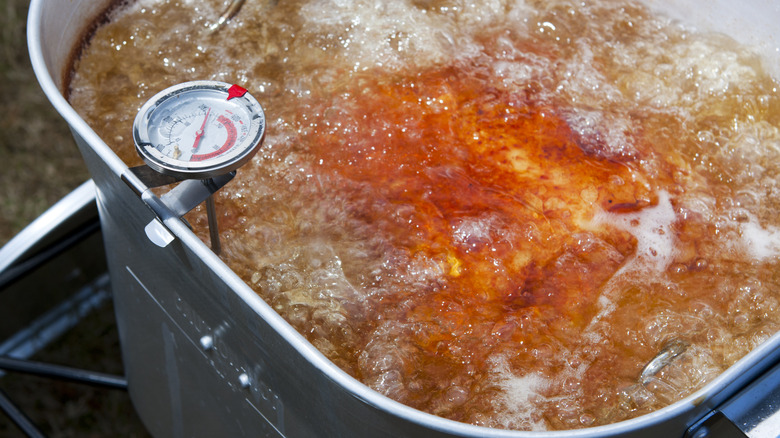Andrew Zimmern's Tip For Just Plain Better Deep Fried Turkey
Deep frying a turkey is known to be one of the riskier methods of preparing our beloved holiday bird, but it's a quick method that produces amazing results when done right so we keep looking for ways to improve upon it. Chef and television personality, Andrew Zimmern, is known for his practical approach in the kitchen, and once more he's come through with a better way to do up fried turkey — beginning with cutting the bird into smaller parts before frying.
Opting to fry turkey in parts rather than whole reduces cooking time, prevents overcooking, and leads to a less oily end product, according to Zimmern. Considering that turkey breasts, being white meat, require less cooking time compared to the dark meat found in legs and thighs, this method ensures that each section cooks to perfection, maintaining an optimal balance in the overall cooking process. By frying just a few pieces at a time, you'll also use less oil, which saves money, makes for less oil to filter and/or dispose of, and means you don't have to work with a huge vat of the stuff.
Brine, flour, and fry for the perfect turkey
Zimmern has a few more tips in the mix to ensure the best-ever fried turkey. He suggests wet brining your bird with seasonings for a few hours, and then allowing the meat to dry out completely in the refrigerator, overnight if possible. The brine will help the meat stay juicy while cooking, and the drying will help the skin be crispy. For food safety purposes, it's important to keep the meat below 40 degrees while you are brining and drying, so you'll need to find some space in your fridge.
Finally, for a super crisp crust, Zimmern takes a page from frying other poultry and suggests dipping the turkey parts in buttermilk and dredging them in seasoned flour. This technique will yield brown and crunchy turkey skin after frying — no soggy, limp skin in this game. Use a meat thermometer to check each part of the meat to check for doneness — the turkey should register 165 degrees for both white and dark meats.

